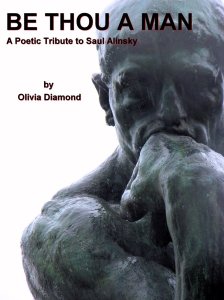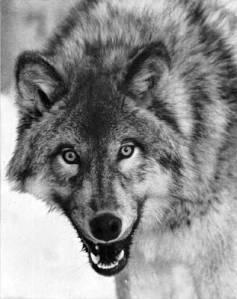
Le Penseur, Museé Rodin, Paris by Innoxious/CC-BY-SA-2.0
The long narrative poem I began in May 2012 available in paperback and e-book editions. The title is taken from a quote of Rabbi Hillel, which Saul Alinsky learned as a boy and sought to adhere to throughout his life that ended suddenly in 1972 on a sidewalk in Carmel, California at the age of 63. Hillel counseled: “Where there are no men, be thou a man.” The cover image of Rodin’s The Thinker is a reminder that Alinsky kept on his desk a figurine of the famous sculpture. The community organizer was expert in using the Socratic method to get people to think about how they could change their lives.
Be Thou a Man is a biography written in formal verse telling the story of Saul Alinsky’s work as a criminologist, social activist, and community organizer–a legacy that Barack Obama drew from in his own work in Chicago. I correct the misconceptions surrounding Alinsky’s name, which some political figures like Newt Gingrich have tried to associate with the far left, socialists and communists. The truth is Alinsky was none of these, and more accurately espoused a grass-roots, democratic process to problem-solving. Because of views I expressed in a Letter-to-the-Editor, I was associated negatively with Alinsky, the insinuation being that because my roots were in Chicago, I was contaminated by Alinsky’s radicalism. My knowledge of the man was vague, so I began to read everything I could find out about him and learned he was no more a radical than the Founding Fathers. In Alinsky’s vocabulary radical is not a derogatory term, but one he proudly adopted. Alinsky did not belong to any political party, but rather fell into the conservative camp in his opposition to Lyndon Johnson’s War on Poverty, which he termed a “prize piece of political pornography.”
The narrative poem is divided into the seven decades of the twentieth century in which Alinsky lived. In the final section, “Missive from the Underworld,” Saul Alinsky speaks from hell to the people living today and comments on current American conditions. The poem concludes with this stanza delivered in his voice:
From out hell’s friendly flames I can spy
the middle class contract, reduced to fears
of foreclosure, not able to get by:
I strike the match to rears of financiers.
From torrid lips I fire furious blast
of liberty’s bugle rousing the caste
whose reservoir of patience has run dry,
their fair share the super-rich have siphoned
off—in protest they march, all toughened,
on Wall Street, the middle in gear at last.
To hell with humdrum chain gang plaints
or Can’t-Win-For-Losing blues anymore
for We’re The People the document paints
paramount, those the Union was made for.
I once said on earth the angles abound;
hear me frolic with angels under ground.
You may ask why on earth write the biography in formal verse? Any numskull knows poetry doesn’t sell. Nobody reads poetry in the United States anymore. Poets don’t have an audience outside of barroom poetry slams. Are you joking? You’re beating your head against a brick wall.
This poet has a thick skull. I wrote my tribute as a long narrative poem because I wanted to. I decry the state of poetry as the reserve of the academics. I still cling to the notion that narrative poetry in the past has appealed to a broad base of general readers and it can again, for narrative poetry is the mode to capture a larger readership for poetry. Published poetry today is either filled with obscure, self-absorbed, abstract images accessible only to its creator or written in prosaic lines. I am a literature major and confess to either not getting most of the poetry I read in Poetry or other prestigious literary magazines or being so bored with the pedestrian lines of prose arranged as poetry that I can’t finish reading the poem. I wrote my tribute as a long narrative poem because I like reading verse-novels such as Byrne by Anthony Burgess and Darlington’s Fall by Brad Leithauser. These are wonderful book-length narrative poems. I enjoyed the challenge of writing Be Thou A Man as a narrative poem. Above all I wrote it in formal verse, because poetry is the best form to praise great men.
 The creator of gripping genealogies for folkloric figures has recovered her gift in The Wolf Gift published in 2012. I was very much a fan of Anne Rice’s power to construct elaborate family trees for vampires and the Mayfair witches, but after Violin I felt her virtuosity wane in some rather weakly developed novels like Pandora and Vittorio, the Vampire. None of her novels after 1997 clicked with me. I attributed the thin gruel she was producing to the pressure of publishers for her to turn out a new book every year.
The creator of gripping genealogies for folkloric figures has recovered her gift in The Wolf Gift published in 2012. I was very much a fan of Anne Rice’s power to construct elaborate family trees for vampires and the Mayfair witches, but after Violin I felt her virtuosity wane in some rather weakly developed novels like Pandora and Vittorio, the Vampire. None of her novels after 1997 clicked with me. I attributed the thin gruel she was producing to the pressure of publishers for her to turn out a new book every year.